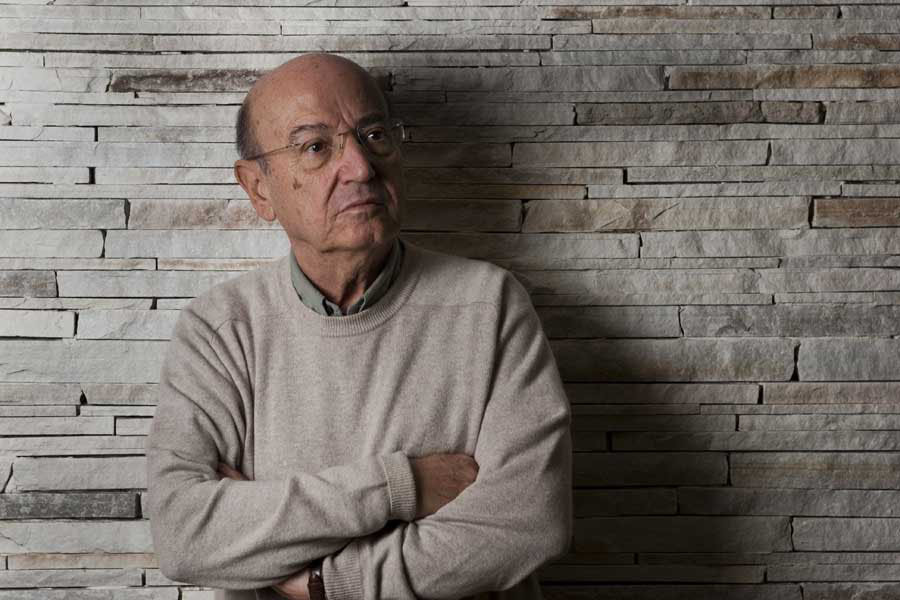He was one of the greatest directors in the history of cinema: Who is Theo Angelopoulos?
Greek master director Theo Angelopoulos, who passed away on January 24, 2012, was born in Athens in 1935. He first started to study in the field of law, but then went to France and completed his cinema education.

January 24, 2012 - The 77-year-old Greek director Theo Angelopoulos, who gifted the history of cinema with masterpieces such as Ulis' View, Infinity and One Day, Troupe, Stork's Delayed Step, Beekeeper and Misty Landscapes, was seriously injured when a motorcycle crashed on the set of the movie set on the Piraeus Drapetsona highway. The famous director, who was taken to a hospital in Faliro by ambulance and taken to intensive care, could not be saved despite the interventions.
Who is Theo Angelopoulos?
Theodoros Angelopoulos (27 April 1936 – 24 January 2012) was a pioneering director of Greek cinema together with Costas Gavras and Costas Ferris. He is one of the most important contemporary representatives of artistic cinema. In his films, which include plenty of mythological references, social events in the historical context are mostly discussed with reference to the individual.
Especially the sufferings and disappointments of the intellectual individual about life are processed. Wide shots and long sequences take place a lot in his films. Most of his films were composed by Eleni Karaindrou.
Life story
Born on April 27, 1935, in Athens as a new member of an upper-middle class family, Theo Angelopoulos' memories of his childhood are filled with the tragedies of the civil war, holding his mother's hand and searching for his father's dead body in the streets of Athens full of corpses.
He had seen plenty of wars in his childhood, and his first memories were the Italian invasion of Greece and the Nazis' entry into Athens.
Angelopoulos, who, like many Greeks, had a dramatic childhood and adolescence, thus became a director making ice-cold films in that warm Mediterranean country.
In his later years, he will put his signature under many works in which he will react to his past in a way, but while he was studying law, what he wanted to do in the years when he published poetry and short stories gradually took shape.
In 1960, his discovery of the movie Vagrant Lovers (À bout de souffle) in Greek cinema led him to go to Paris after completing his military service.
After a short training in filmology and anthropology, as well as literature, at Sorbonne University, he attends courses at a French film school called L'IDHEC (Cinematographic Research Institute).
However, Angelopoulos' provocative panoramic shots, which will evolve into very long shot sequences, which we will see in all his films in the following years, were not accepted in the institute he attended in Paris during his first years of education, and he was expelled from the school in 1961. But here, at least, he finds the opportunity to get close to the French cinematographer Jean Rouch.
Before returning to Greece at the end of 1963, he worked with Jean Rouch at the Musée de l'Homme during the day and at night as a host at the Cinémathèque Française, where he acquired the foundations of his cinematic culture.
Returning to Greece after severing his connection with the school in Paris, Angelopoulos works as a film critic in the daily newspaper Democratic Change (Demokratiki Alagi), which was later closed by the military junta, and wrote weekly columns on cinema until 1967.
Meanwhile, in 1965 he begins work on a feature film called Forminx Story, a partial documentary about the story of a pop band, but gives up shooting due to a disagreement with the producer.
In 1968, he directed a short film called Broadcast, which is a Jean Rouch-style realistic cinematic work and features street interviews about people's ideal spouse fantasies.
This is Angelopoulos' first collaboration with the great cameraman Giorgos Arvanitis, who has contributed creatively to all but the Weeping Meadow and Dust of Time, his last two films.
During this time Angelopoulos soon finds his own style, which is very clearly deeply personal and poetic, and this first film forms the basis for his later work, which is filled with regular and subtle references to classical myth literature.
The most important themes that he frequently emphasizes in his films are the traditional Greek rural life, which has undergone a great change due to the Second World War and the Civil War.
Angelopoulos, who sees the cinema as the breath that gives him life, is very excited when he starts a new film; He said that he felt a tingling in his skin and that he thought this particular feeling was a bit like making love.
Citizen Kane, 1941, Ivan Groznyy, 1944, Ordet, 1955, 8½, 1963, The Gold Rush, 1925, Ugetsu Monogatari, 1953, Pickpocket, 1959, Persona (1966) are among Angelopoulos' favorite films in the world of cinema that influenced him so much. would take place.
Kathimerini, one of the important newspapers in Greece, gave the news of Angelopoulos' death in the headline implying that his death might be suspicious and expressing the claim that the vehicle that hit Angelopoulos belonged to the police.
